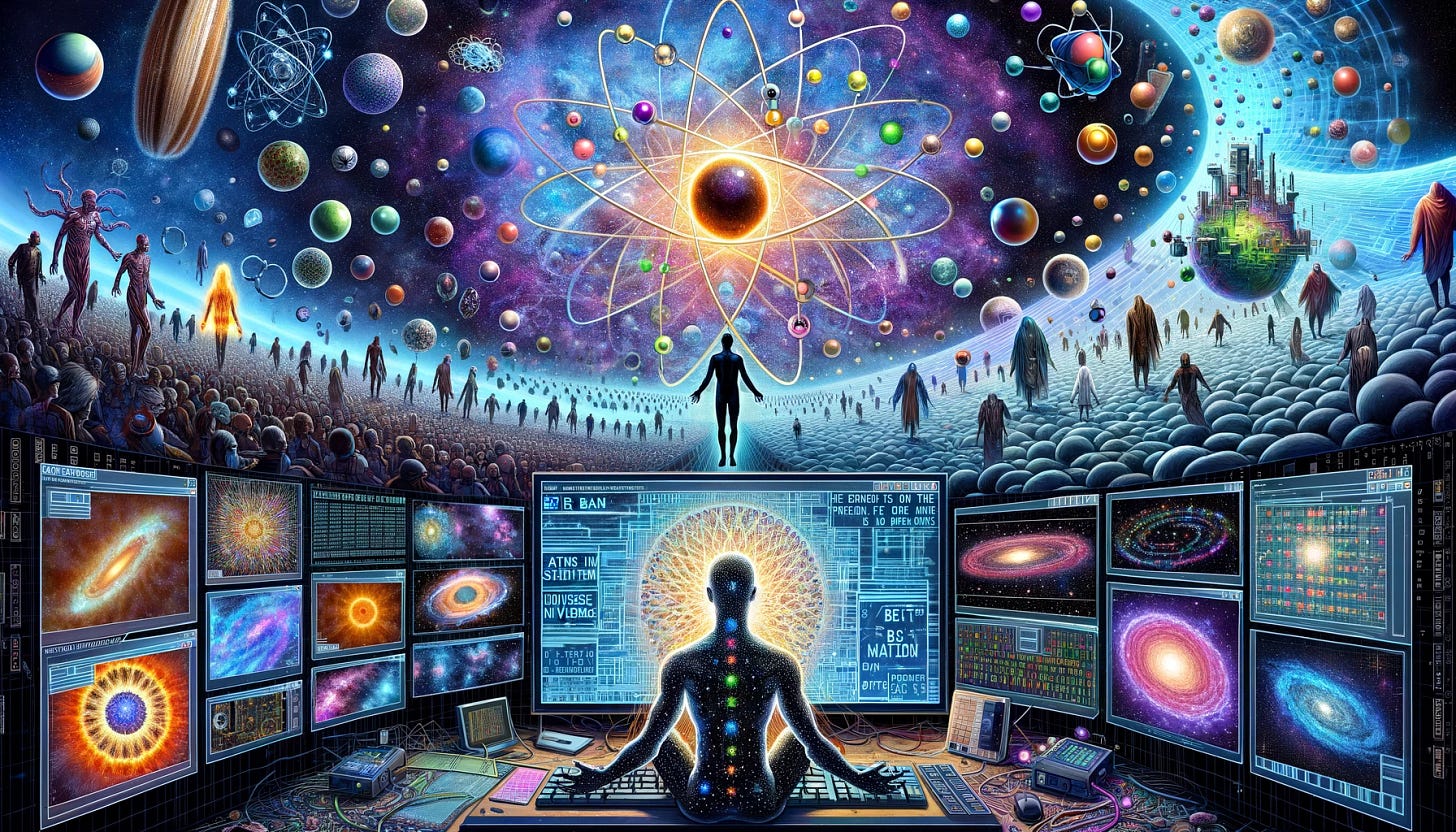Are We Living in a Simulation?
Simulation Theory - Are you an NPC or are you ported in from outside the simulation?
Happy Sunday, everyone! I hope you’re having a nice weekend.
On the Frontier Letter, I write bi-weekly structured, deeply edited newsletters. I will occasionally release idea explorations outside the Frontier Letter format, in which I think through an idea on my mind. I write and speak about ideas every single day. I will start posting some of these thought sessions here because I think 1.) they're relevant to the Frontier Letter and 2.) They're analogous to a podcast; they may not be eloquently refined, but they can be both insightful and impactful!
I hope you enjoy it!
Are you Reading From a Simulation?
"We're in a simulation; the Big Bang was pressing the on button, atoms are bits, the multiverse hypothesis is accurate, and the other universes are simulations running parallel on the same hardware. Some of us are NPCs (I hope not me), and others are ported in from outside the simulation."
This idea was part of my piece "World's Most Experimental Newsletter," where I presented 50 ideas ranging from speculative thought to playful exploration to thoughtful conviction.
I was listening to Joe Rogan’s podcast today, and he was talking to an interesting individual, Rizwan Virk. He discusses the simulation hypothesis in a quite convincing manner. Riz is a graduate of MIT and Stanford, a video game engineer, venture capitalist, and a professor at ASU. He even teaches a class on the simulation hypothesis, which posits that we are living in a simulated reality, much like in science fiction movies similar to The Matrix.
The way he speaks about the simulation theory is striking because it’s similar to how I enjoy thinking about and have been circling around this idea for some time. From my perspective though, this has been more of a speculative, fun exploration. Riz makes arguments for it with a level of conviction not mostly used in thinking about simulation theory.
At this moment, it’s not possible to say whether it’s true, and of course, I have no idea if it is. It's fun to think it is, and some formidable technology thinkers, like Elon Musk, think it's not only possible but seems probabilistically likely. I think it's a nice model of the world that helps make sense of everything from physics to religion, but it's also heavily speculative and, in a sense, a new religion in and of itself.
The topic of the simulation theory is multi-dimensional and covers many areas that I have been deeply curious about and interested in, such as technology, science fiction, religion, philosophy, and gaming. Quantum physics has been an unexpected rabbit hole in the idea of the simulation theory, but it plays an important role. In fact, it’s quite interesting that the simulation theory tethers itself to the material world as a possible fact by looking at quantum physics.
Once I found out about the observer effect, it solidified a perspective that intuitively felt right but seemed insane to say 10 years ago: our perceptions are just as important, if not more so, than the actual physical and material world. The observer effect grapples with this idea that measurement alters the state of what is measured in some manner.
The most prominent thought experiment here is Schrodinger’s Cat, in which there is a thought experiment that goes as follows: “A hypothetical cat may be considered simultaneously both alive and dead, while it is unobserved in a closed box, as a result of its fate being linked to a random subatomic event that may or may not occur.’
There has been a related philosophical issue that has existed for a long time—the idea that the world is perceived through a manifestation of our senses. This means we can only ever know the world through our senses.
This idea can be traced as far back as Plato's allegory of the cave and a prominent argument of Immanuel Kant's proposition that we can never know the "thing-in-itself" because our understanding of the world is mediated completely by our sensory experiences and cognitive faculties, central to his "Critique of Pure Reason."
This philosophical idea applies to the simulation theory because it raises the notion that, in the same way, we can’t see atoms; we perceive them through our senses, which could just be rendered experiences of the collection of atoms. In other words, the world around us could be computer-generated, and our senses make it recognizable in a way that we want to recognize it.
The observer effect supports this idea because even quantum physics now demonstrates that a particle's properties have different possible values prior to being measured. Upon measurement, the values of those properties exist …
I'm no quantum physicist, but these ideas, in combination, raise questions about the nature of the universe and highlight key philosophical points.
Measurement affects the state of things at the quantum level. So, to what extent does the observer shape physical phenomena? Is it possible that the observer's perceptions affect the state of physical phenomena in full? Are objects in a specific state because we all have a shared “dream” of the world that renders it the same way?
We can look at this psychologically, too: humans are action-predicated creatures. Setting goals is important partly because it mediates what we see in the world. We see the world as obstacles or pathways to that given goal. An obstacle to the goal raises a threat and evokes anxiety, while pathways are dopaminergic triggers.
I experienced this when my wife and I were in the market for a new car last year. It seemed that we started to see Kia Sportages everywhere because it was in the running for selection, and observing other Sportages on the road had become a pathway to achieving the goal! Once we made our final selection, I have not noticed a single Sportage on the road since, nor have I cared about it.
There’s also certainly a computational argument. The basic computer language, bits, are manipulated so that the computer can generate whatever the programmer wants you to see. This means the bits are perceived in the way that the creator wants them to be perceived. The perception is based on the bit-bender or software engineer.
So, how can we know that atoms are not bits? Has someone from outside bent the atoms of the universe so that they are set to a predefined parameterization, which can be altered by us only to a certain extent that we call the laws of physics?
I have also thought in the past that a good way to look at religious texts is as an attempt to understand the parameters of a ‘good’ life. In the frame of simulation theory, you can look at religious texts as historical simulated characters' (read: ancestors') attempts to parameterize the way to make the simulation a worthwhile experience before you’re shut out of it.
In fact, simulation theory may be a religious evolution. In the same way that when religious texts were written, they were a way of understanding the parameters for a ‘good’ life in the context of how they understood the world; I think it’s the case that simulation theory is the start of a new religious understanding of the world that makes sense based on how we now understand it to work.
At the same time, the justifications and arguments laid out for simulation theory can likely be studied and applied to other mystical and religious understandings of the world. Regardless of all the scientific and rational ways you can look at this, there are certain leaps that need to be made to believe in this, which is why it’s a belief and not a scientific type of knowing. Which, by the way, doesn’t make it wrong, but it does put it in this category which is arguably more closely linked to a religion than it is to a science.
So what, then, of our universe? Who is bending the bits on the outside?
We don’t know; I have no clue.
What do we do with our current knowledge of the simulation theory? Again, we don’t know.
It’s really another way to try and come to terms with this wacky, absurd, suffering-guaranteed life.
If we live in a simulation - I just hope I’m not an NPC 🙂
And if I am, well, I’m one who writes newsletters, so that’s pretty cool.
If you enjoyed it, drop a like, sub, and share with someone who you think would enjoy it!
I write more structured bi-weekly posts called "Frontier Letters," in which I explore topics at the intersection of humanity and technology. Stay tuned if you'd like to join the conversation!
Take care :)
Dom









